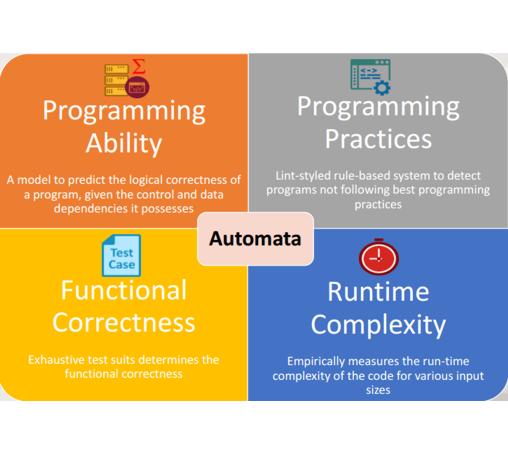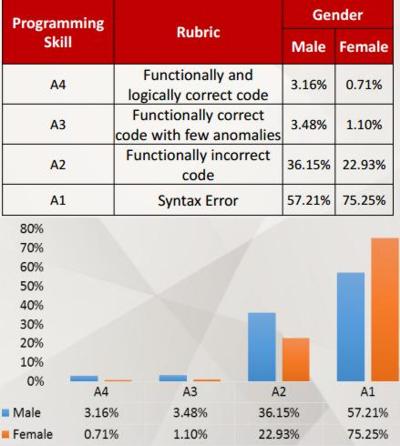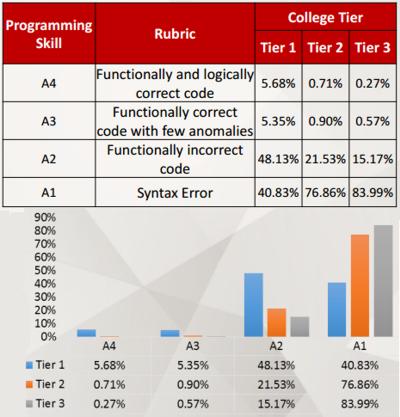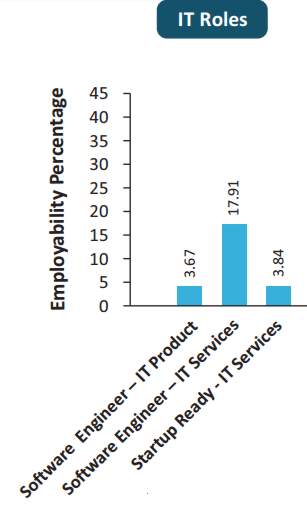| Indian Progammers Aren't Being Prepared For Real World Coding |
| Written by Janet Swift |
| Wednesday, 26 April 2017 |
|
A new study of the programming skills of Indian students shows that only a tiny proportion are ready to be employed in programming jobs. The research comes from talent assessment firm Aspiring Minds and is the first to be based on Automata, an automated test graded using machine learning. Candidates are provided with a couple of programming problems and must write the solution in a simulated compiler integrated environment in their choice of C, C++ or Java. They can compile and execute the code to find how it is performing on test cases. Automata grades their solutions on how close its implementation logic is to a correct one. The headline results of testing over 36,000 engineering students from IT-related departments of more than 500 colleges are something of a wakeup call:
Automata has four subsections: Using these four divisions the findings are:
Notice that A1 and A2 are what you don't want and together total 95.23%. Combining A3 with A4, gives the 4.77% considered to possess the minimum requirement for the programming world of work. A4 is further subdivided by the study and 63.84% of the elite group (i.e 1.4% of all students tested) are the ones who can write functionally-logically correct, efficient & maintainable code. There is less of a gender gap among Indian students than in the United States - the ratio of males to females in the study was 6:4, but the test results for females showed them to have less ability than their male counterparts:
There is however a big difference by tier of college where Tier 1 are the ones recognised as the most prestigious:
The difference is even more marked looking at the Top 100 colleges against the rest with 8.13% achieving A4 and another 6.79% A3. But only 15% of employable programmers graduating from India's elite Computer Science institutions is worrying to say the least.
If you are tempted to dismiss these results as the findings of a new and possibly erroneous testing tool, it is worth looking at last year's report National Employability Report 2016 from Aspiring Minds which used its adaptive assessment methodology and was based on a sample of more than 150,000 engineering students graduating in 2015 from 650+ engineering colleges 1 across multiple Indian states. It looked at candidates suitability for employment in distinct roles and revealed that only a tiny minority were employable as software engineers in IT product companies or in IT services for technology startups, although a greater proportion capable of less demanding roles in IT services companies.
Again there was a big difference between the top 100 colleges and the rest: The report comments: Startup Ready ‐ IT Services: Investments and growth of technology startups is the new business story in India. To sustain this growth, we need candidates with high technology caliber, comprehensive understanding of products and the attitude to work in a startup. With this in mind, startups want to hire ready-to-deploy manpower. Unfortunately, we find that only 3.84% of engineers qualify for a startup technology role. This is a big concern and would surely hamper the growth of startups in India. Software Engineer ‐ IT Product: A worryingly low employability percentage of 3.67% has been observed for this role. This is because jobs in IT product companies require a strong understanding of computer programming and algorithms. The study found that candidates strongly lacked the required skills: around 90.72% of graduating engineers do not have the desired programming and algorithm skills required for IT product companies, whereas 72.77% show lack of soft-skills and 59.40% lack cognitive skills. Software Engineer ‐ IT Services: The employability of engineers in IT services companies is 17.91%. It should be noted that this has been calculated according to the current hiring philosophy of IT Services companies, where the candidate is not expected to already possess the required software skills or soft skills, but is imparted the training over a period of 3 to 6 months. The hiring criterion for this industry, thus, is that the candidate should be trainable in technical and soft skills. This requires both a basic command of language and technical skills, together with requisite cognitive skills to respond to training in a short period of time. Considering these rather lax requirements, the fact that only 17.91% of the graduates are trainable into software engineers within a period of 3 to 6 months, is alarming to say the least. The research further shows that approximately 52.21% engineers are rejected because they are not softskill trainable in a short period of time, whereas around 49.28% lose on technical trainability. These are, to say the least, damming conclusions. They come however from a reputable company based in India and so likely to be free of any xenophobic bias. We recently reported on the USA's clamp down on its H-B1 visas which is likely to have an impact on Indian outsourcing companies that bring junior level staff into the US in order to train them within US corporations before returning to India. This makes it all the more important for Indian colleges to address the shortcomings in producing job ready graduates. More InformationAutomata National Programming Report Related ArticlesUS Curtailing H-1B Visas For Computer Programmers HackerRank Reveals Where To Find Programming Talent Where to Find Top Women Coders Russian Students Break Contest Records To be informed about new articles on I Programmer, sign up for our weekly newsletter, subscribe to the RSS feed and follow us on Twitter, Facebook or Linkedin.
Comments
or email your comment to: comments@i-programmer.info |
| Last Updated ( Wednesday, 26 April 2017 ) |








